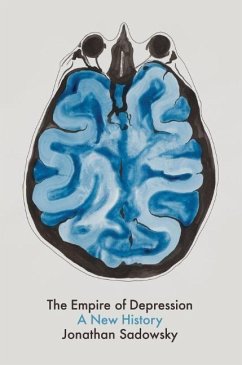Depression has colonized the world. Today, more than 300 million of us have been diagnosed as depressed. But 150 years ago, "depression" referred to a mood, not a sickness.
Does that mean people weren't sick before, only sad? Of course not. Mental illness is a complex thing, part biological, part social, its definition dependent on time and place. But in the mid-twentieth century, even as European empires were crumbling, new Western clinical models and treatments for mental health spread across the world. In so doing, "depression" began to displace older ideas like "melancholia," the Japanese "utsushM," or the Punjabi "sinking heart" syndrome.
Award-winning historian Jonathan Sadowsky tells this global story, chronicling the path-breaking work of psychiatrists and pharmacists, and the intimate sufferings of patients. Revealing the continuity of human distress across time and place, he shows us how different cultures have experienced intense mental anguish, and howthey have tried to alleviate it. He reaches an unflinching conclusion: the devastating effects of depression are real. A number of treatments do reduce suffering, but a permanent cure remains elusive. Throughout the history of depression, there have been overzealous promoters of particular approaches, but history shows us that there is no single way to get better that works for everyone. Like successful psychotherapy, history can liberate us from the negative patterns of the past.
Hinweis: Dieser Artikel kann nur an eine deutsche Lieferadresse ausgeliefert werden.
Does that mean people weren't sick before, only sad? Of course not. Mental illness is a complex thing, part biological, part social, its definition dependent on time and place. But in the mid-twentieth century, even as European empires were crumbling, new Western clinical models and treatments for mental health spread across the world. In so doing, "depression" began to displace older ideas like "melancholia," the Japanese "utsushM," or the Punjabi "sinking heart" syndrome.
Award-winning historian Jonathan Sadowsky tells this global story, chronicling the path-breaking work of psychiatrists and pharmacists, and the intimate sufferings of patients. Revealing the continuity of human distress across time and place, he shows us how different cultures have experienced intense mental anguish, and howthey have tried to alleviate it. He reaches an unflinching conclusion: the devastating effects of depression are real. A number of treatments do reduce suffering, but a permanent cure remains elusive. Throughout the history of depression, there have been overzealous promoters of particular approaches, but history shows us that there is no single way to get better that works for everyone. Like successful psychotherapy, history can liberate us from the negative patterns of the past.
Hinweis: Dieser Artikel kann nur an eine deutsche Lieferadresse ausgeliefert werden.
?Drawing from literature, medicine, psychology, anthropology, and memoir, Jonathan Sadowsky shows how much the history of depression informs our present understanding of it. This is an immensely readable book which challenges dogmatic opinions about a complex condition which may be ?hard to manualize? but, sadly, is also too often politicized.?
Linda Gask, writer and psychiatrist
?Sadowsky deftly guides the reader across history and continents in search of depression?s past, present, and future. Engagingly written, measured in tone, and nuanced in its conclusions, The Empire of Depression never loses sight of the human suffering at the heart of its subject.?
Greg Eghigian, editor of The Routledge History of Madness and Mental Health
?fascinating.?
New Statesman
?a wise and discerning work.?
Shepherd Express
Linda Gask, writer and psychiatrist
?Sadowsky deftly guides the reader across history and continents in search of depression?s past, present, and future. Engagingly written, measured in tone, and nuanced in its conclusions, The Empire of Depression never loses sight of the human suffering at the heart of its subject.?
Greg Eghigian, editor of The Routledge History of Madness and Mental Health
?fascinating.?
New Statesman
?a wise and discerning work.?
Shepherd Express








